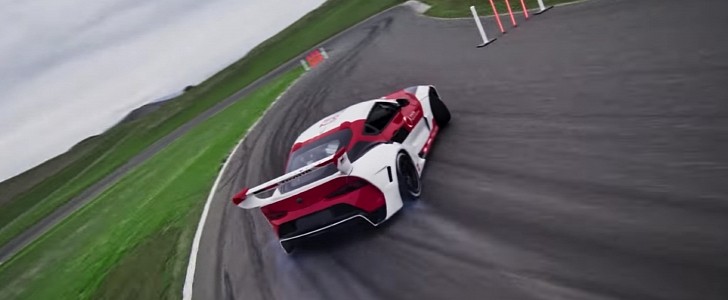When The Matrix (1999) debuted, immersive virtual reality was a thing of fiction. Last year, Facebook announced Meta, and the realities of a virtual future have never felt this close. Similarly, Upgrade 2018, an Australian cyberpunk action film, fictitiously showcased a future with fully autonomous vehicles. Recently, Tesla announced it would put on hold the production of Cybertruck to prioritize FSD technology.
In a world with fully autonomous vehicles, what will happen to motorsports? You might not know this, but self-driving technology is slowly creeping into racing as well. Racecar purists will throw shade at the idea, but a 'fully-engaged driving experience' is becoming a rarity in automotive development.
Mitsubishi introduced Active Yaw Control (AYC) for torque transfer, Porsche and others has rear-axle steering for stability, Ferrari hasa Side Slip Control driver-aid algorithm - the list is endless.
It's arguable how much help driver-assist features bring. Some will say they help in acceleration, carving through a corner, or reduce oversteer and understeer, but at the heart of it, these technologies are taking challenging tasks out of a driver's hands.
"Driver-assist systems relieve the driver of the task of driving, offer more comfort and increase safety. In an emergency, a driver-assist system can even take control of a car," BMW says.
Tesla's FSD technology isn't in its advanced stages, but CEO Elon Musk has bet the company's future on it. Its newer version of the FSD Beta was subject to a recall after it gave drivers headaches during "rolling stops," which the National Highway Traffic Safety Administration (NHTSA) felt could increase the risk of a crash.
While Tesla isn't fully into motorsports, Its models are almost as competitive on the track as industry leaders. Through TRI (Toyota Research Institute), Toyota has successfully programmed a race car to drift on a closed track autonomously.
The team is developing on-demand technology that will help prevent drivers from crashing on the track. In the highlight video, TRI said, "this technology will temporarily give an ordinary driver the drifting skills of an expert." Their main goal is to learn how these new technologies can augment and amplify drivers on the race track.
For passenger cars, the idea of a fully autonomous car is about the evolution of transportation. A society with autonomously driven cars can change the entire aspect of car ownership.
AutoX, Didi, and Waymo already operate autonomously driven taxis, and it's only a matter of time before it jumps into privately driven cars and finally into racing. In motorsports, the whole idea behind driver-assist features points toward driver comfort and safety. At this stage, it's uncertain what effect autonomous technology will have in the sport.
Mitsubishi introduced Active Yaw Control (AYC) for torque transfer, Porsche and others has rear-axle steering for stability, Ferrari hasa Side Slip Control driver-aid algorithm - the list is endless.
It's arguable how much help driver-assist features bring. Some will say they help in acceleration, carving through a corner, or reduce oversteer and understeer, but at the heart of it, these technologies are taking challenging tasks out of a driver's hands.
"Driver-assist systems relieve the driver of the task of driving, offer more comfort and increase safety. In an emergency, a driver-assist system can even take control of a car," BMW says.
Tesla's FSD technology isn't in its advanced stages, but CEO Elon Musk has bet the company's future on it. Its newer version of the FSD Beta was subject to a recall after it gave drivers headaches during "rolling stops," which the National Highway Traffic Safety Administration (NHTSA) felt could increase the risk of a crash.
While Tesla isn't fully into motorsports, Its models are almost as competitive on the track as industry leaders. Through TRI (Toyota Research Institute), Toyota has successfully programmed a race car to drift on a closed track autonomously.
The team is developing on-demand technology that will help prevent drivers from crashing on the track. In the highlight video, TRI said, "this technology will temporarily give an ordinary driver the drifting skills of an expert." Their main goal is to learn how these new technologies can augment and amplify drivers on the race track.
For passenger cars, the idea of a fully autonomous car is about the evolution of transportation. A society with autonomously driven cars can change the entire aspect of car ownership.
AutoX, Didi, and Waymo already operate autonomously driven taxis, and it's only a matter of time before it jumps into privately driven cars and finally into racing. In motorsports, the whole idea behind driver-assist features points toward driver comfort and safety. At this stage, it's uncertain what effect autonomous technology will have in the sport.









